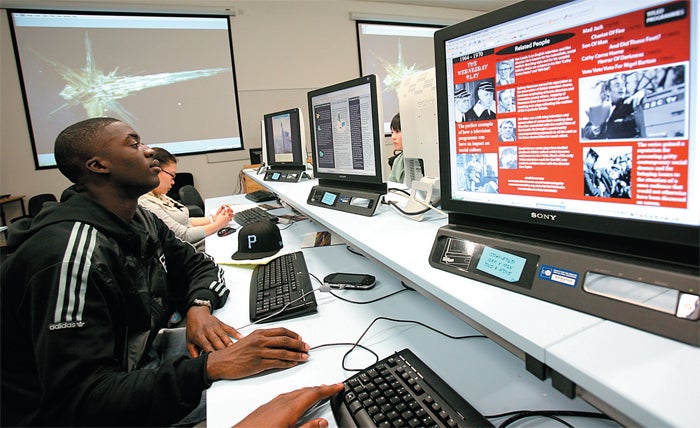Visual arts degrees: digital media

Take a closer look at the breadth of subject matter covered as part of a digital media degree.
Digital media degrees, although – like the industry itself – very new, provide students with a good grounding in the language and skills of the sector. Expect to study various aspects of the digital industry such as multimedia and web design, television and audio production and digital imaging. Most universities allow you to specialise towards the end of the degree with a final project of your choosing. By the time they finish the course, graduates will be competent in using software such as Adobe Photoshop, Illustrator, InDesign, Dreamweaver, Flash and Apple Motion.
Courses will often include subjects based on analysis of current media distribution, as well as media within its social, cultural and economic context. Within the industry, more and more production activity is being created, recorded and manipulated digitally, so computer skills are now an integral part of the creative package for any would-be media student.
Students have to be resourceful in this new environment and look outside their courses at other studies that sit alongside their programmes; they need to discover what animators are doing and what multimedia students might be able to offer. Increasingly, they will work in cross-sector groups in much the same way that professionals do. More faculty websites are being created to allow students from a variety of courses to find each other and work together.
It is not only production processes that are being affected by the increasing use of digital technologies, but distribution and consumer activities too. Lots of students use social sites such as Facebook on the web and are a part of the revolution that sites such as YouTube are leading when it comes to their viewing and listening patterns.
Music is at the forefront of evolving consumer processes and soon film, animation, television and multimedia will be more widely available on the web. Different distribution systems will need to be set up and innovative ways of making a living from creative activities will have to be evolved. It is only by being aware, being adaptable and being creative, that the student of today will survive in the digital world of tomorrow.
You will need between 200 and 280 Ucas points for most digital media courses, depending on the institution. Assessment is through coursework in technical disciplines and analysis; exams are common, as is group work. Some universities direct their assessments to lead toward the completion of a final portfolio, which is then useful for future employment.
Graduates of digital media courses come away with a degree that is useful across the media industry. Television and video production companies, the computer games industry, newspaper and radio production: they all use digital professionals. Skills also extend to other industries, such as conference and presentation businesses, while the vibrancy and fast growth of the industry also allows opportunities for entrepreneurs. It’s an exciting place to be.
- Adrian Marden is the head of school of film, music and media at the University of Hertfordshire, www.herts.ac.uk
- Want some work experience with The Independent Student Team?
Join our commenting forum
Join thought-provoking conversations, follow other Independent readers and see their replies
Comments